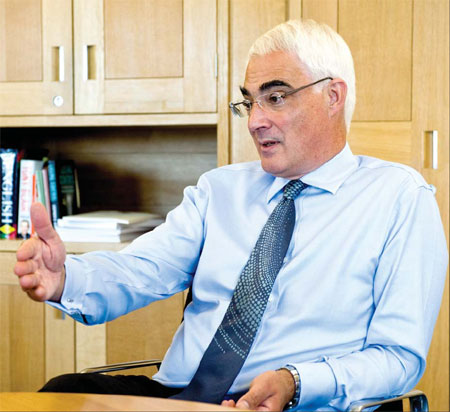Economic balance shifting East
Updated: 2011-11-04 11:47
By Andrew Moody (China Daily European Weekly)
|
|||||||||
|
 Alistair Darling says that China's fate is also heavily dependent on what happens in the West. [Nick J B Moore / for China Daily] |
Former UK finance minister, who foretold economic crisis, says China should have seat at top table
Alistair Darling believes the economic crisis will see a shift in the economic balance of power from the West toward China and the rest of Asia.
The former British chancellor of the exchequer (finance minister), who was arguably the first major Western politician to publicly recognize the severity of the looming financial turmoil, believes this is an inevitable consequence of the meltdown of the Western banking system.
"There is no doubt in my mind this crisis will accentuate the move of the center of economic gravity from the West to the East," he says.
Darling, who has been out of office for 18 months since former prime minister Gordon Brown's government lost the UK election last year, was in a relaxed mood in his modern suite of offices in Portcullis House, opposite the Houses of Parliament.
The relative calm was in marked contrast to the events he describes in his new book Back from the Brink, which records his central role in the economic storm.
It was he, in fact, who drew the comparison between what was unfolding and the aftermath of the Wall Street crash in an interview he gave to The Guardian newspaper while on holiday on the Scottish isle of Lewis just over three years ago.
He said the world was facing the prospect of the worst economic downturn for more than 60 years. His comments, which he says "unleashed the forces of hell", went round the world. He was under pressure from Brown's advisers to retract them. Then three weeks later came the collapse of Lehman Brothers and everyone was silenced.
"Sixty years is possibly wrong. It is probably 100 years. You take your pick. It is bad," he says.
With Brown, he was eventually responsible for putting together a rescue package for the British banks in 2008 that was to provide the blueprint for how nearly all other nations responded to the economic crisis, including China with its own 4 trillion yuan ($630 billion, 455 billion euros) injection into its economy.
"It culminated in a meeting (of government heads) in London where he (Brown) locked the door and said no one was going until we reached an agreement. Communists countries, democracies, East and West all did the same thing," he says.
"And China certainly did. It made a decision it was going to maintain consumer spending and the banks were instructed to lend money and they did."
Darling, who speaks with a gentle Scottish burr and has a ready dry wit in private, has fond memories of China and on one visit to Beijing he was treated to a special dinner because it was his birthday.
"I like Chinese food and they put on this fantastic Chinese meal. I had no idea they knew it was my birthday," he says.
He says the longer-term perspective Chinese politicians can take on issues is often in marked contrast to the realities politicians face in the West.
"I was struck by one conversation I had. We were talking about the medium term and my interlocutor said: 'Yes. The next 100 years will be quite difficult.' And I was thinking how many elections do we have between now and then. They certainly do take a longer term view," he says.
Darling does not come from a traditional socialist background of many Scottish Labour politicians.
A great uncle was a Conservative MP and he himself went to one of Scotland's top schools, Loretto, before being admitted as an advocate at the Scots bar.
He is content with being the member of parliament for Edinburgh South West for the time being and is away from the frontline of British politics for the first time in more than two decades.
His period as chancellor was a stormy one not just because of the financial crisis but because of the partial breakdown in his relationship with Brown, who at one point wanted to sack him, something that Darling resisted.
Darling's book, which was serialized in the UK, was one of the first insider's account of an often troubled government.
Is he still on speaking terms with Brown?











